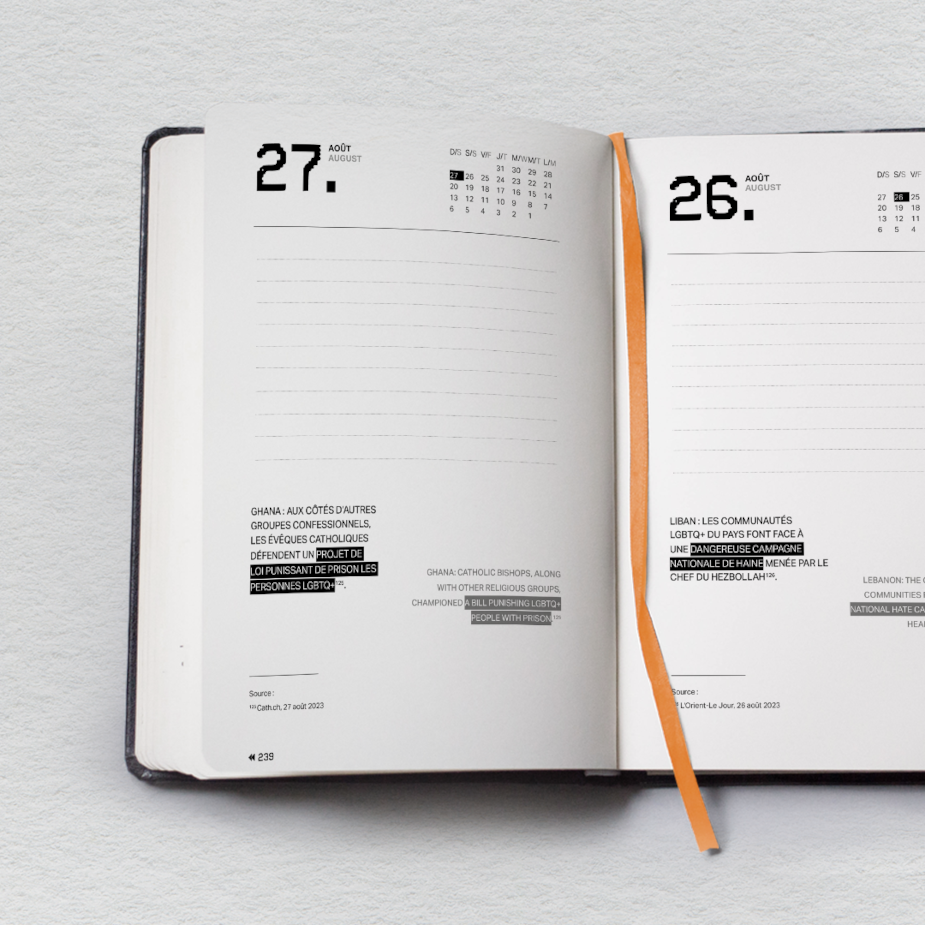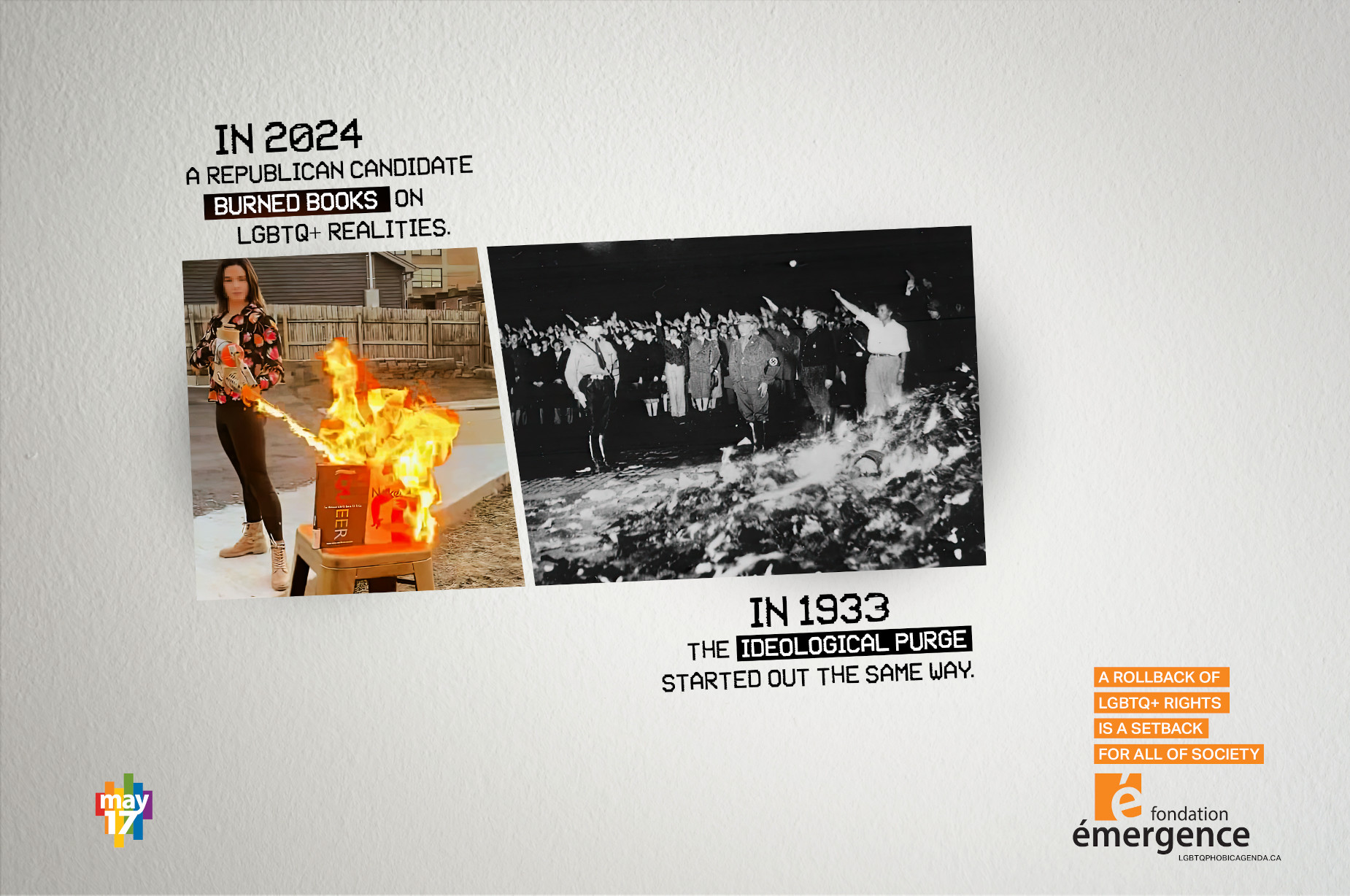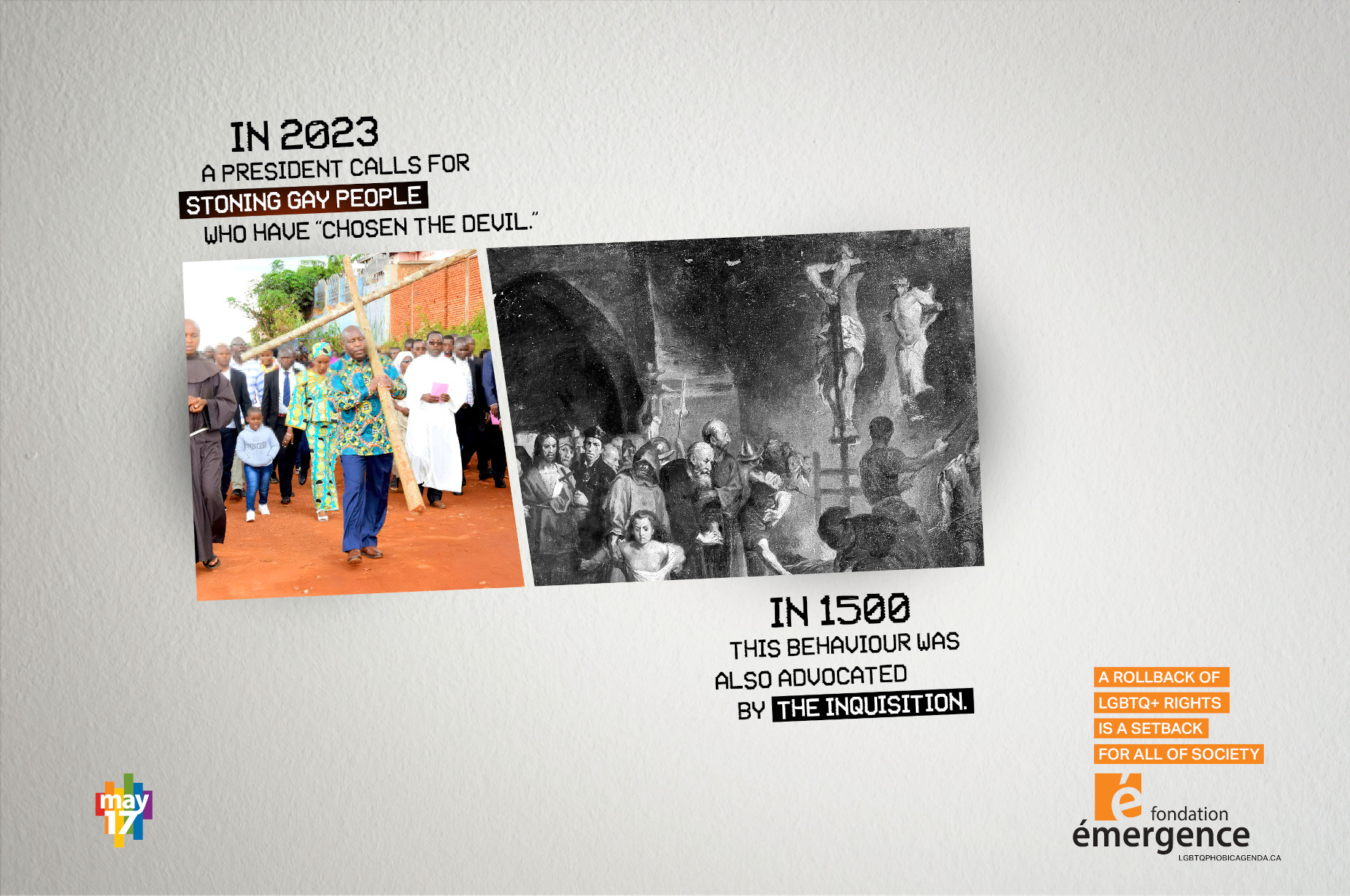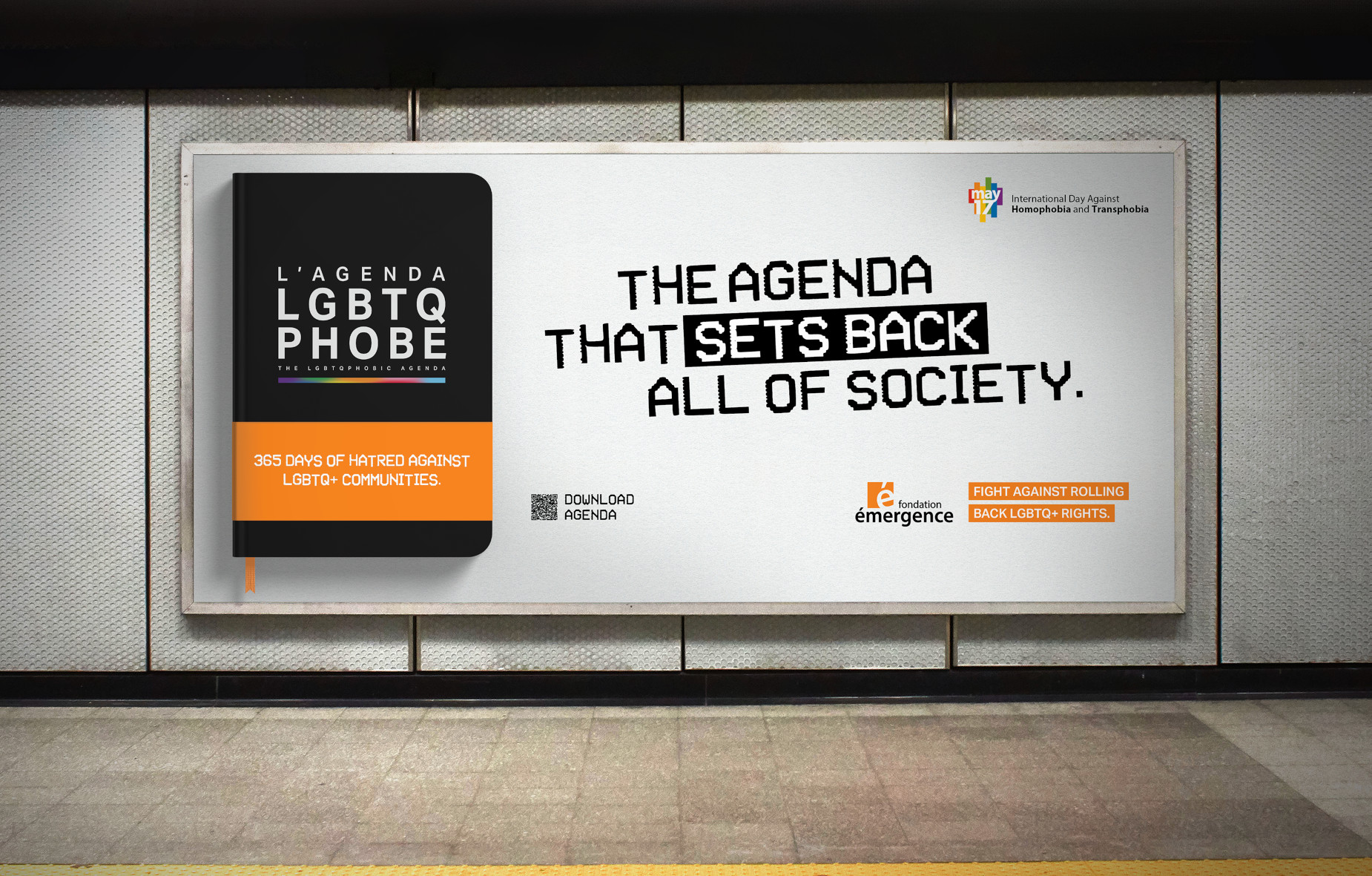
Why This Canadian Foundation Published an ‘LGBTPHOBIC Agenda’

It’s a scary time to be in the LGBTQ+ community. Even in the safest countries that (on paper) support this demographic’s fundamental rights, there’s been aggressive pushback… especially in recent years. Some of it comes from bigots with loud mouths. But, worse, much of it comes from legislative bodies.
Consider this statistic. According to Montreal-based organisation Fondation Émergence, since January 2023, in the US, over 600 anti-LGBTQ+ bills have been introduced. This is a country that is supposed to be one of the safer ones in the world for LGBTQ+ populations. And yet, somehow, in the year 2024, rights are being rolled back? It’s troubling to say the least.
Seeing this all go down, Fondation Émergence and Havas Montreal felt the need to do something, and so they partnered up to raise awareness and draw attention. Playing with the laughable notion that the LGBTQ+ community has an ‘agenda’ (other than, you know, seeking basic human decency and the right to live), the two decided to turn the tables and create the ‘LGBTPHOBIC Agenda’ which exposes the discourse and violence that belongs in the past, yet, sadly, remains present.
Featuring an almost 400-page book, the campaign was also complemented by a brutal video, ‘Outing the Outdated’, which compiles the horrifying comments of politicians and people in recent years, as well as OOH with tactical placements. Moreover, Havas also oversaw the organisation of a ‘Backwards March’ on International Day Against Homophobia and Transphobia, where hundreds of protesters marched backwards down the streets of Montréal to raise awareness for the need to fight the rollback of LGBTQ+ rights around the world.
To chat more about how this came to life, and exactly why the work needed to pull no punches, LBB’s Jordan Won Neufeldt sat down with Carle Coppens, chief creative officer at Havas Montreal, for a chat.
LBB> Creating an integrated campaign for International Day Against Homophobia and Transphobia is no small task! As such, what was the brief, and what immediate ideas came to mind?
Carle> In 2023, despite some notable advances, several countries have hardened their policies regarding the recognition of LGBTQ+ rights. Media and political rhetoric became more trenchant – either through electoral calculation or ideological bias. It soon became clear to us that the theme of rolling back rights, unfortunately, corresponded to the current situation, and offered us the opportunity to apply it to a variety of media forms.
LBB> Specifically, where does one get started with something like this? And why were both a live ‘Backwards March’ and creating the ‘LGBTQPHOBIC Agenda’ the right ways to draw attention to the rollback?
Carle> We are all inundated with disposable content. With this campaign, we're not interested in adding noise to noise, especially when it comes to communicating about an issue that has a tangible impact on the lives of a marginalised community. Creating the agenda and organising the ‘Backwards March’ are the results of a complementary effort to capture attention. On one hand, you’ve got an agenda of almost 400 pages, solidly documented, and on the other, a march whose images are immediately impactful, even for someone absent-mindedly scrolling through social media.
LBB> Let’s talk about the Agenda. What was the creation process like, and how did you work with Fondation Émergence to expose the negative discourse and violence that by now should be outdated?
Carle> For years, conservative circles have been referring to a so-called ‘gay agenda’ – an organised and all-powerful shadow lobby that would influence the decisions of politicians around the world, and against which we would have to fight to preserve traditional family values. So, the idea of creating an ‘anti-gay agenda’ – an agenda that goes back in time to show the daily aggressions suffered by the LGBTQ+ community – was an obvious way to set the record straight.
With some research, we realised that it was possible to list one violent event (often more) per day. The diary is therefore a concrete way of honouring the victims and proving the point. It's a concrete publication and an awareness-raising tool – the result of teamwork between Havas for the concept, and Fondation Émergence, which organised the collection of information. In fact, the agenda is situated at the meeting point of documentary and creative work, like the rest of the campaign. Announcing a decline in rights requires proof. Our work reminded us that current events provide more than enough.

LBB> And how did this translate into the creation of the ‘Outing the Outdated’ film? What was the writing process like?
Carle> As I said earlier, the words of many elected politicians have themselves become harsher in recent times. So, the film seeks to show how these words – by calling into question principles we took for granted – can influence our societies and legitimise even harsher comments and actions in everyday life and on social media.
Starting from a general framework, we knew we wanted to use old media devices (TV, radio, slides, etc.) to broadcast what politicians were saying today, and thus show that their ideas belonged to a bygone era. It was then the search for news clips that guided the construction of the film.
LBB> Speaking more about the film, the narrative is quite bleak, and pulls no punches with the content. Why was this the right creative approach for the job?
Carle> It was a deliberate choice. The words of elected politicians, even when expressed with all the decorum and veneer of respectability that comes with the exercise of power, are violent in themselves. That's what we wanted to show. The conceptual interest in our opinion comes from the juxtaposition of present-day words and broadcasting channels that belong to the past. These words could have been uttered several decades ago, and yet… they are today, and their impact on the general atmosphere and safety of the LGBTQ+ community is undeniable.

LBB> And how did you approach sourcing the footage and editing it all together to create something powerful?
Carle> Director Amélie Hardy and editor Ludauvick Geoffroy (Post430) did an absolutely fantastic job with it. They gathered all relevant footage from different sources and gave them a narrative structure that truthfully reflects the objectives of a campaign like this.
LBB> Equally important were the campaign posters. What was the design process like? And how did you approach placing them in tactical locations?
Carle> I have to admit, the poster campaign provoked quite a few reactions. Most of them were excellent, but it also revealed the discomfort companies feel when confronted with the reality of violence suffered by the LGBTQ+ community. A major Canadian media company, after much internal debate, finally decided not to broadcast it on its network. A historical sponsor of Fondation Émergence was afraid of being associated with it. Yet, the poster simply juxtaposes real events.
Of course, there is a notion of scale. The fact that a Republican candidate burns books on LGBTQ+ realities with a flamethrower, for example, is equivalent to the auto-da-fé conducted by the Nazis in Berlin. It would be false and dangerous to pretend otherwise. What the campaign is saying is that such actions are being taken and disseminated on social media today, and that history has tragically shown us just how far such abuses can lead. Fondation Émergence appeals to our collective vigilance to ensure that the horrors of the past are not repeated.


LBB> With all that established, tell us more about the main event. What did it take to coordinate the Backwards March on a logistical level? And how did you attract participation?
Carle> To avoid too large a crowd turning up on the day of the Backwards March, we had to send out a limited number of invitations and provide quick training for participants. Representatives from different levels of government took part in the Backwards March exercise, which is not as easy as you might think for a crowd!
LBB> Finally, as a whole, what challenges came with this project, and how did you overcome them?
Carle> The campaign includes many pieces. In advertising, there's often an obsession with a campaign effect, where all the pieces look the same. In this case, we deliberately chose to focus on a single theme – that of rolling back rights, rather than a campaign signature or type of visual execution. During the creative process, we had to fight against this urge to do things in the usual fashion, i.e. to ensure that each element was absolutely consistent with the others. Since the success of this type of campaign, beyond the media placement across Canada, depends enormously on how it is shared, we relied on the strength of each medium to get the message across. The Agenda, the film, the Backwards March, the poster campaign – all say the same thing, but with their own specific angle. All it takes is exposure to one or the other to understand the overall message of Fondation Émergence.













